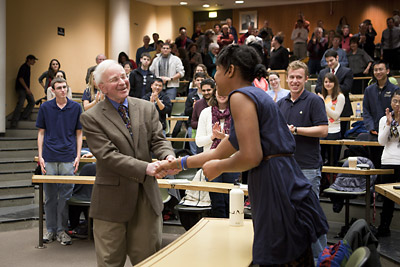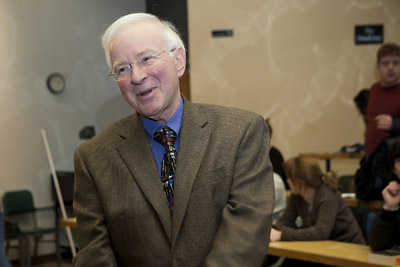Polenberg reflects on his 45-year Cornell career


When history professor Richard Polenberg joined the Cornell faculty in 1966, "it never occurred to me I would spend the rest of my life here and would end up teaching more than 25,000 students. But it was the best thing that could have happened to me," he said. "I've always believed the job I have here is the finest job any historian could ever have."
Polenberg reflected on a lifetime of learning and teaching history in the final class lecture in his American Constitutional Development course before his retirement, Dec. 1 in Bache Auditorium. He reprised the talk later that day for the Mortar Board Senior Honor Society's Last Lecture series.
Polenberg, the Marie Underhill Noll Professor of History and a Stephen H. Weiss Presidential Fellow, first came to campus at age 25 to do research as a Columbia University graduate student, and remembered swimming in Robert Treman State Park with his then-2-year-old daughter.
He paid tribute to one of his early mentors at Brooklyn College, black historian John Hope Franklin; and to William E. Leuchtenburg '43, his doctoral adviser at Columbia, "a man whose teaching and scholarship I found exemplary and still do."
He also honored several esteemed colleagues at Cornell with anecdotes and memories, from Paul Gates, who joined the faculty the year before Polenberg was born, to the "young American historians" he joined on his arrival -- Walter LaFeber, Michael Kammen and Joel Silbey -- who would establish themselves as pre-eminent in their respective fields.
Polenberg said he considered himself fortunate to have as department chair Frederick Marcham, who taught well into his 90s.
"His true calling was the art of teaching of young people -- encouraging their interest in history, drawing them out, building their self-confidence and showing them how a liberal education can help them lead richer, more satisfying lives," he said.
As he once told a student, what interests Polenberg most about history is that "the problems human beings faced in the past are essentially the same problems that we face now. ... The problems themselves don't change that much."
The problems of justice, inequality and freedom in America have informed much of his teaching.
"My approach to teaching lecture courses was to address how these broad issues affected real people," he said. "What I cared about the most were the human beings that were the stuff of history, not the broad trends or large-scale developments. Those people often tended to be outsiders or victims. So my students heard a lot about Sacco and Vanzetti, Japanese-American internment and the Julius and Ethel Rosenberg case.
"I told myself that students could always read about the subjects I neglected, but that my role was to let them see how much the past meant to me."
Cornell also "enabled me to meet some extraordinary people," he said, a list that ranged from Alger Hiss and sportscaster Howard Cosell to activists Father Daniel Berrigan, Pete Seeger and Jello Biafra; and four Supreme Court justices.
Mentioning some of his future plans, Polenberg said he has been invited to teach a seminar on the 1960s at New York University; and he hopes to teach a course in constitutional history at Auburn Correctional Facility for the Cornell Prison Education Program.
He has approached Cornell University Press about publishing a book he plans to write about activist Alexander Berkman, and he expects to continue hosting his Slope Radio show "Key to the Highway," a labor of love reflecting his longtime interest in folk and blues music.
Get Cornell news delivered right to your inbox.
Subscribe